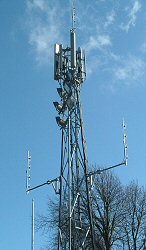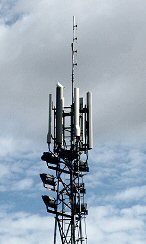


   |
News: BBC South Today, 15 April 2004 |
|||
|
Together we can become informed, campaign, and make a difference. |
Peter Sitch, O2 Airwave, interviewed by Stephen Humphrey, BBC, over Home Farm, Dibden TETRA mast removal for being counter to planning regulations. Humphrey: What happens now? Sitch: We will be putting up another mast. Humphrey: In the same place? Sitch: We will be putting up another mast. Humphrey: Have you decided exactly what you are going to do to get that mast in place - in a sense getting permission for it, actually making sure that you get some local opinion behind you? Sitch: We will be putting up another mast. And I hope that the disinformation that's been promulgated on the media is going to be reversed by the sensible sound people in Dibden rather than some of the rather unreasonable objections that have been put forward to what is a very very important communications system for the police and emergency services. [end] Professor Colin Blakemore, Chief Executive of the Medical Research Council, interviewed on South Today, 15 April 2004 over TETRA safety on the occasion of removal of the mast at Home Farm, Dibden. Q: Many people believe there are health risks; is there any evidence to substantiate their fears? Blakemore:No, I really think there isn't and certainly no more evidence of any risk from TETRA base stations compared with ordinary mobile phone base stations. You have to keep in mind that the emissions from base stations as felt by people in the street and around them, or nearby are always hundreds or even thousands of times less strong than the radiation you get from using an ordinary mobile phone. The conclusion from the Stewart Committee was that base stations really should not be considered a hazard. Q: So; these are TETRA masts in particular - why are you so sure that they don't pose health risks? Blakemore: The focus of interest on TETRA is because the handsets in TETRA used by the emergency services emit pulses of radio frequency waves, but ordinary mobile phones don't have the same pulsing pattern. And there was some evidence in the 1970s from experiments that pulsed radio frequencies might have effects on cells and tissues in the body that continuous radiation doesn't. Now in fact one has to say those studies have not been duplicated in subsequent work, and in any case the effects that were described didn't have any obvious health implications. But taking a really really fiercely precautionary approach, the Stewart Committee said, well maybe pulsing should be avoided if possible. Well, it's there in TETRA handsets for very very good reasons and I would still stick to the view that there is no evidence of a health risk. But the really important thing is the base stations don't emit pulses anyway, they emit continuous radiation and at very very low levels as experienced on the ground. So I really think people should not be worried about a health risk. [end] |
 TETRA, Worthing FC. Exceeds planning terms, erected without any consultation and affecting many surrounding residents’ health and well-being. And now, below, with no further planning application, this mast is GSM, UMTS and TETRA. Three out of eight masts now at this site surrounded by dense housing.  |
|
Home | |||